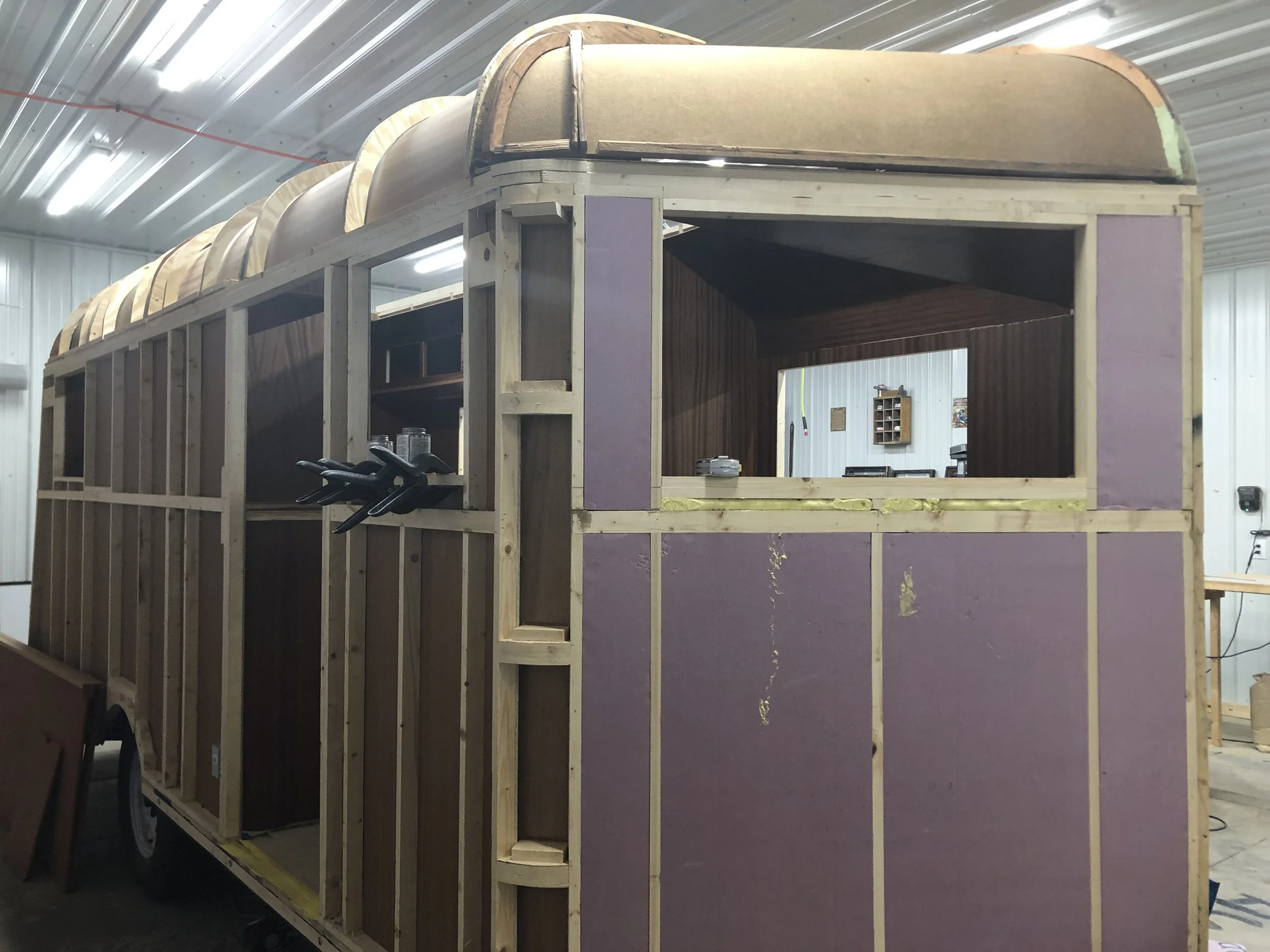A Partnership Echoed in Time
by Nicole McGillis, Blueberry Hill Classics (Photographs copyright Blueberry Hill Classics, 2025)
This is the story of two partnerships. It starts in 1930, when Clarence Lutes spotted a novelty on his street in Kalamazoo: a trailer coach prototype. Inspired, he returned to his workshop, where he and his wife, Frona, designed and built one for their own use.
Clarence and Frona Lutes
On their very first trip to the shore, however, a fellow camper offered $450 for the trailer, and they sold it on the spot. Clarence and Frona decided to make more and began producing about six trailers per year out of their backyard. As soon as they could build the trailers, they were sold.
At first, Clarence continued his work as a garment cutter for the Grace Corset Company, but by late 1934, demand was so great that they decided to enter trailer manufacturing full time.
Clarence secured a shop and hired help. He became President of the newly formed Kozy Coach Company, and Frona served as Vice President. Together, they created a sterling reputation for the company—and cemented their legacy as pioneers in the field. The trailers were well-regarded for their quality and design. Within just two and a half years, the company was producing 45 trailers per month.
The Luteses proved to be a strong team in these early days of trailer manufacturing, leveraging Clarence’s mechanical skills and Frona’s design sensibilities. They even committed to testing every new trailer model themselves to ensure the customer experience would be a good one. After just three years, Kozy Coach had become a leader in the growing industry. They continued to expand the business, acquiring additional facilities, and in 1938 Kozy Coach acquired a competitor—Silver Dome Corporation—which, at the time, was the oldest trailer-making firm in existence.
By 1939, Clarence was treasurer for the Trailer Coach Manufacturers’ Association, and the Kozy Coach Company was selected to represent the industry at the 1939 World’s Fair in New York City.
Campers outside a Kozy Coach in 1941, enjoying the Sarasota trailer park in Florida
In early 1940, Clarence sold the Kozy Coach Company and its Silver Dome division. He retired for a time during World War II, and sadly, Frona passed away in 1942.
Yet Clarence continued to feel the pull of trailer-making. He made headlines again in 1950 when he founded a new business: the Lutes Trailer Company. When asked why he returned to the industry, Clarence replied,
“The bite of the trailer bug was just too strong to resist.”
Under its new ownership, Kozy Coach continued production until the early 1960s, when a downturn in orders—along with major changes in manufacturing and marketing—led to the discontinuation of both the Kozy Coach and Silver Dome brands.
Flash forward to 2010…
John and Nicole McGillis
Another husband-and-wife duo—John and Nicole McGillis—spotted a silvery 1941 Kozy Coach trailer sitting in a field. Like Clarence and Frona, we had originally gotten into travel trailers as a hobby. Though we’d only worked on 1950s- and 60s-era Shasta trailers up to that point, we were undaunted by the seventy-year-old trailer. As soon as we stepped inside the Kozy, we knew it was something special with its beautiful mahogany woodwork lining the interior.
We bought the trailer, but as so often happens, life got in the way. The Kozy followed us as we built a house and then later moved to another. The trailer was even stored at a friend’s house for a time—waiting patiently to be restored.
The Kozy Coach, as found
Eventually, we launched a restoration business, Blueberry Hill Classics. And finally, in 2020, the Kozy Coach was among the first trailers to enter our new workshop.
We dove into the project, beginning with a complete teardown of the trailer and the construction of a brand-new frame to duplicate the original structure. To keep our momentum going, we worked on other projects alongside the Kozy—and in the end, the restoration took five years.
Before and after removing the skin
Completely rebuilt; framing and walls were duplicated to the original design
Partnerships aren’t always easy, but like Clarence and Frona, we balanced our strengths. Sometimes we worked side by side; other times we divided the tasks—John as master builder, and me handling research, product sourcing, design, and upholstery.
In-progress build, with new insulation
As we rebuilt the Kozy, we were careful to honor the Kozy Coach Company’s dedication to quality craftsmanship and timeless design, while also discreetly incorporating modern conveniences—a small wet-bath, charging ports, and more.
As a 1941 model, the trailer represents an important moment in history; it was produced just before many U.S. manufacturers pivoted to support the war effort. Kozy Coach specifically ceased production for a time and then restarted, with the company redirecting its focus to the Silver Dome models for war industry workers. The burgeoning trailer industry provided a valuable service, helping to supply housing quickly for the millions of war workers suddenly needed at defense production plants throughout the country.
Named “Victory,” she is a true survivor—one of only a handful of Kozy Coaches known to remain from this era. Its red, white, and blue color scheme evokes a time when Americans banded together for a common cause.
We’re honored to have restored and preserved this piece of history. We hope Clarence and Frona would approve.
To learn more about Victory, this 1941 Kozy Coach trailer—or to inquire about purchasing it—please contact John at (218)821-7822 or email us through the button below.
$99,000















